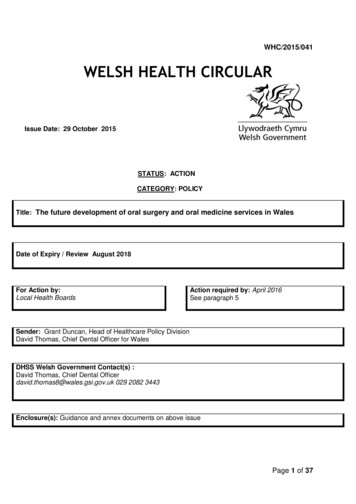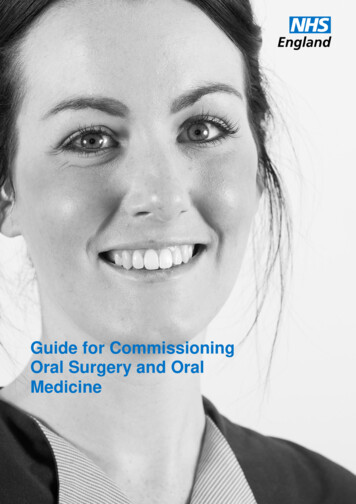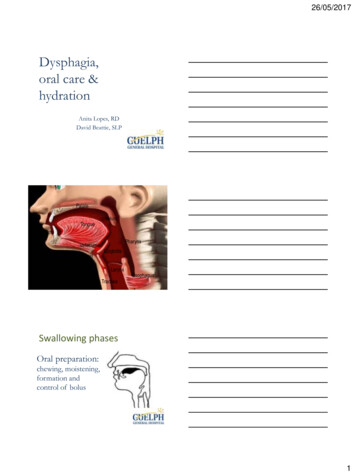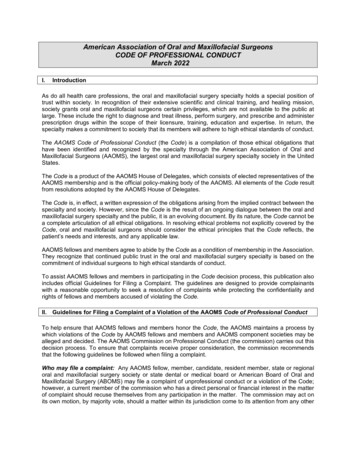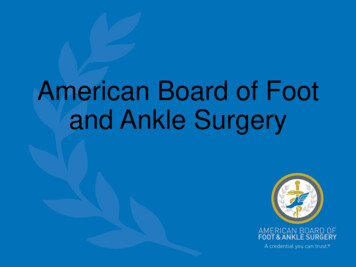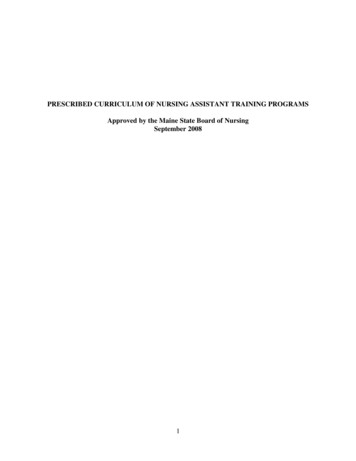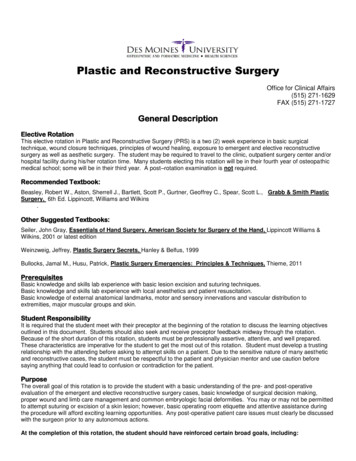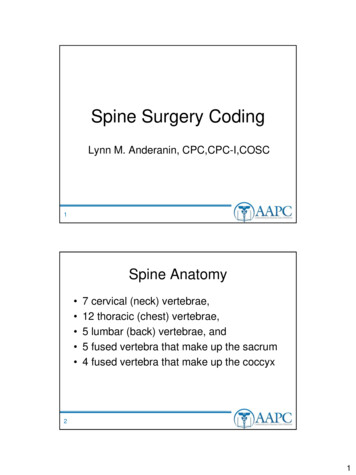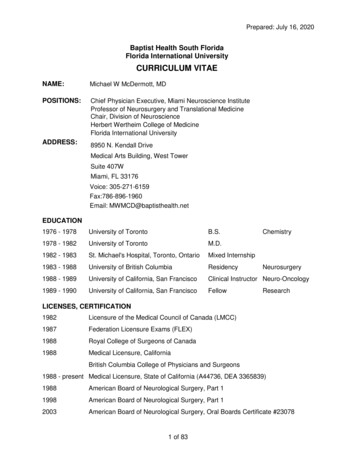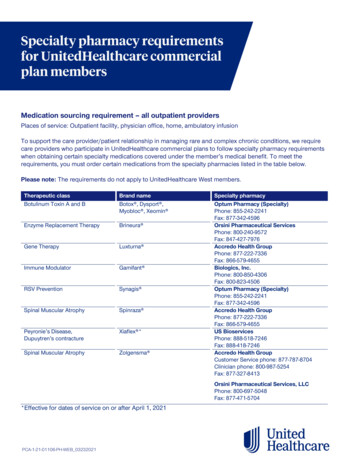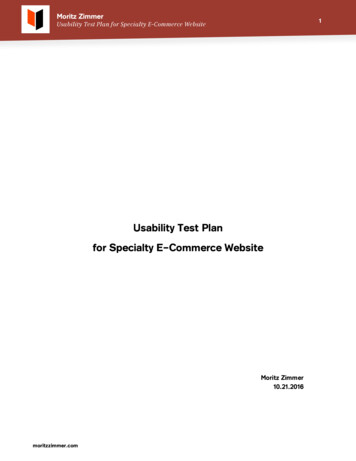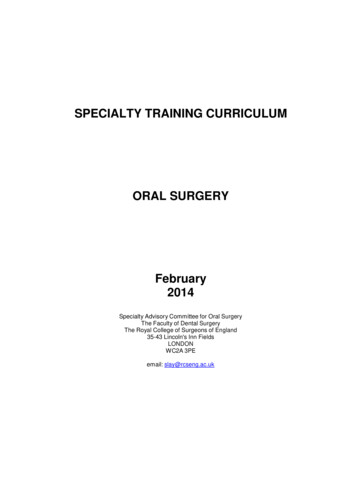
Transcription
SPECIALTY TRAINING CURRICULUMORAL SURGERYFebruary2014Specialty Advisory Committee for Oral SurgeryThe Faculty of Dental SurgeryThe Royal College of Surgeons of England35-43 Lincoln's Inn FieldsLONDONWC2A 3PEemail: slay@rcseng.ac.uk
TABLE OF CONTENTSIntroduction3Standard 1: Rationale41.1 Purpose and context of training41.2 Linkage to subsequent stages of education and training41.3 Criteria for entry to specialty training41.4 Structure of specialty training programmes5Standard 2: Content of learning72.1 General professional content (see Appendix)(18-39)2.2 Specialty-specific content (see Appendix)(40-57)2.3 Methods of assessment7Standard 3: Model of learning10Standard 4: Learning experiences11Standard 5: Supervision and feedback13Standard 6: Managing curriculum implementation14Standard 7: Curriculum review and updating15Standard 8: Equality and diversity15Glossary16References17Appendix18-572
INTRODUCTIONOral Surgery in the UK is a dental specialty recognised by the General Dental Council. The titleOral Surgeon is limited to registered dentists included in the specialist list in Oral Surgery. Theaward of the Certificate of Completion of Specialist Training (CCST) will require evidence ofsatisfactory completion of a broad training in Oral Surgery as outlined in this curriculum.Introductory notes taken from the 2010 version of the curriculumThe curriculum takes, as its guidance, the Postgraduate Medical Education and Training Board’s(PMETB) Standards for Curricula. It has been developed from the Joint Committee for SpecialistTraining in Dentistry Specialist Advisory Committee (SAC) for Oral Surgery Guidelines for the UK (a)and represents a modern flexible approach to training. The SACs contain members representing thekey specialist societies for that discipline. It has been developed with reference to other curriculaalready developed for medical, surgical and dental specialties and the ethos within the NHS (b). Thenew curriculum has been written to PMETB/SDEB standards by the current SAC in Oral Surgeryfollowing discussion by the committee and specific feedback from the Dental Facultyrepresentatives, committee representatives of The British Association of Oral Surgeons, TheAssociation of British Academic Oral & Maxillofacial Surgeons, The British Association of Oral &Maxillofacial Surgeons, SDEB and trainees in Oral Surgery.The key elements of the training programme include pre-registration specialist training (standard3) with the future potential for modular credentialing. The latter will allow flexibility of training suchthat trainees may take an approved break (in accordance with the sections on taking time out oftraining in the Dental Gold Guide (currently paragraphs 6.55 – 6.79)). Alternatively, individualmodules could be available to those seeking to complete their training and achieve a CCST. Inother words, it develops the availability of a ‘skills escalator’. This will be in partnership with othereducational and health bodies (e.g. local universities and nationally such as RoyalCollege/Faculties). Those who wish to follow an academic route can incorporate a researchdegree as well as an expanded teaching role – possibly as an Academic Clinical Fellow (ACF) orClinical Lecturer (CL).An introductory note on the 2014 version of the curriculumThe curriculum was subject to minor amendments in 2014 to demonstrate clearer mapping to thevarious assessment methods. The clinical content remains unchanged.3
STANDARD 1: RATIONALE1.1Purpose and context of trainingThe purpose of this curriculum is to guide the training of an Oral Surgeon to the core level ofcompetence required for a UK specialist. This training will produce dentists who are specialists inthe field of Oral Surgery who will become registered on the GDC Specialist List on completion oftraining. In future this core curriculum will be used as the framework for evaluation of priortraining, experience and skill in the development of top-up training in Oral Surgery.The GDC report on specialist lists published in December 2005 approved a series ofcompetencies for the oral surgery curriculum (c,d). The core competencies are considered aminimum requirement to be achieved by all trainees and would lead to the award of a CCST.Specialists in Oral Surgery may also gain extended competencies, which represent additionalaspects of specialist clinical practice (included in EU document XV/E/8385/3/95-EN) and mayform other elements of development (see below). The function of the GDC is to oversee corespecialist training and to make the award of the CCST. The curriculum set out below is thereforelimited to the core competencies in Oral Surgery.1.2Linkage to subsequent stages of training and educationIt is recognised that CCST holders employed as substantive and honorary consultants in the NHSin Oral Surgery are required not only to practise core specialty skills but also to possess a rangeof extended competencies. These are detailed in ‘Career Development Framework for ConsultantAppointments in Oral Surgery’, available from the SAC in Oral Surgery (d).1.3Criteria for entry to specialty trainingAccess to the Oral Surgery specialty training programmes will be competitive. All appointmentsshould follow the guidance of the new Dental Gold Guide.A specialist trainee (StR formerly SpR) must be registered with the General Dental Council priorto commencement of training. A minimum requirement for entry to specialist training is 2 years ofpostgraduate foundation training or equivalent. It is desirable that during the early training yearsthe individual has experienced work in as many sectors of dental provision as possible. Trainingshould also include a period in secondary care in an appropriate cognate specialty. Evidence ofexcellence in terms of attributes such as motivation, career commitment will be expected, as willan ability to demonstrate the competencies required for entry to specialist training either bysuccessfully completing a period of agreed dental foundation training or by demonstrating thatthose competencies have been gained in another way.Markers of completion of a two year foundation training period may include MJDF (Membership ofJoint Dental Faculties RCS England) or MFDS (RCSEd, RCPS Glasg and RCSI). Successfulcompletion of one of these quality assured membership diplomas of Royal College DentalFaculties in England, Scotland and Ireland remains a useful indicator that an individual hasachieved the necessary level of competence for entry into specialist training. However it isrecognised that this will not be essential and that candidates may be able to demonstrate suchcompetence in different ways.Entry to the specialist training programme may be at different levels depending upon proof ofcompetence. Proof of these competencies will be assessed after gaining entry and such trainingwill be judged by their clinical trainers by observing them treating patients.4
1.4Structure of Training ProgrammesDelivery of the programmeOral surgery training will be delivered over the equivalent of a three-year full time programme. Theprogramme should lead to Membership in Oral Surgery of a Royal College (M Oral Surgery), aCCST, entry onto the specialist list in Oral Surgery, and therefore eligibility to practise as aspecialist. This three-year programme comprises the “core competencies” in Oral Surgery. Thesecompetencies, which will form the basis for the assessment leading to the award of the CCST,may be supplemented by knowledge and experience in allied subject areas, and may form part ofa continuum of specialist training and post-CCST development (d).The preferred training pathway is one which integrates experience gained in severalenvironments. For example, this could include periods of training in a dental teaching hospital withrelevant attachments in Oral Surgery or Oral & Maxillofacial Surgery departments in districtgeneral hospitals, or specialist centres. It is desirable that several specialists in Oral Surgerycontribute to training. A minimum of two trainers - both on relevant specialist lists (for example,Oral Surgery and Oral and Maxillofacial Surgery) - is required. These trainers must conform to therequirements for educational and clinical supervisors outlined in the Dental Gold Guide (currentlyparagraphs 4.16 and 4.19).Structure of Specialty Training programmesTraining programmes should include suitable rotational arrangements to cover all the necessaryareas of the curriculum and may include an appropriate balance between teaching hospitals, adental school, district general hospitals and specialist units, such that each trainee gains thebreadth of training required for satisfactory completion of the curriculum.Reduction in the length of the training period may follow accreditation of prior learning, trainingand experience. Evidence of competence acquired through previous training and experience inspecialist Oral Surgery will be taken into account by the SAC and/or Deanery in setting therequired length of training.The training plan must be structured and training should take precedence over service provision.The training curriculum has been planned in modules linked to various topics. Modules need notnecessarily be studied in the order presented.Duration of trainingThe usual training period is three years (WTE) but accredited prior experience gained in OralSurgery may be taken into account when determining length of training. Trainees will sit theSpeciality Membership in Oral Surgery (M Oral Surg) of the Royal Surgical Colleges of GreatBritain following successful completion of training.In order to complete training and be recommended for the award of a CCST, trainees must have: satisfactorily completed the equivalent of at least 36 months of training (WTE).satisfactorily completed all areas of the curriculumpassed the Speciality Membership in Oral Surgeryobtained an Annual Review of Competence Progression (ARCP) Appendix 5 Outcome 6(Dental Gold Guide).5
Less than full time training is permitted in accordance with the Dental Gold Guide. Current adviceis that less than full time training must be for a minimum of six sessions per week but localcircumstances may vary.Approval must be obtained in advance from the local Deanery, possibly following advice from theSAC, for periods of detachment from training programmes and for clinical experience abroad inother centres for both full-time and part-time trainees.ResearchTrainees, who wish to acquire extensive research competencies, in addition to those specified inthe generic element of the curriculum, may undertake a research project as an ideal way ofobtaining those competencies. They may take time out of programme to complete a specifiedproject or research degree. Time out of programme will need prospective approval and thesupport of the Postgraduate Dean. Funding will need to be identified for the duration of theresearch period.Distribution of Time within Training ProgrammesIn full-time training posts, the trainee should spend at least 6 sessions per week involved inpatient contact relevant to the oral surgery curriculum with at least three of those sessionsdevoted to supervised operating i.e. work-based experiential learning.A balanced programme will, for all trainees, comprise supervised personal treatment sessions,diagnostic sessions, review clinics, formal and informal teaching, research and reading time.Should the trainee additionally undertake a higher university degree during the training period, thetime devoted to that degree will depend upon university regulations and how the sessions aredispersed over two or three years of the training programme.CaseloadThe workload for an Oral Surgery trainee - either in full or less than full time training - should besufficient to ensure that a full range of cases is experienced.Trainer TrainingThe quality and ability of the trainers is an important element in successful training. Ideally theyshould have completed specialty training in oral surgery themselves, and they must be on thespecialist list for Oral Surgery. Trainers must undertake Continuing Professional Education andupdate clinical and teaching practice. This should be checked at their appraisal meetingsAward of the Certificate of Completion of Specialist Training (CCST)On successful completion of the programme and having passed the M Oral Surg, an applicationcan be made via the Postgraduate Dean to the General Dental Council for the award of aCertificate of Completion of Specialist Training (CCST) and entry to the General Dental Council’slist of Specialists in Oral Surgery.6
STANDARD 2: CONTENT OF LEARNINGMethods of assessmentThe purpose of training as laid down by the GDC is to promote patient safety by working toensure that specialists have achieved the appropriate learning outcomes. The SAC in OralSurgery aims to promote excellence in the practice of Oral Surgery and to be responsible formaintaining standards through training, assessments, examinations and professionaldevelopment.The close relationship between specialists and trainees in Oral Surgery should facilitate frequentfeedback. This is supplemented by regular appraisal by the educational supervisor and annualevaluation by the Assessment Panel, under the auspices of the Postgraduate Dean. Continuousappraisal throughout training will be undertaken by the educational supervisor and other seniormembers of staff.Workplace-based assessment tools will include mini-CEX (clinical examination exercise), casebased discussions (CBD), DOPS (direct observation of procedural skills), procedure basedassessments (PBA) and miniPAT (mini peer assessment tool). The Intercollegiate SurgicalCurriculum Programme (ISCP) has piloted these methods and has demonstrated their validity andreliability.The purposes of the assessments: indicate suitability of choice at an early stage of the chosen career pathindicate the capability and potential of a trainee through tests of applied knowledge andskill relevant to the specialtydemonstrate readiness to progress to the next stage(s) of training having met therequired standard of the previous stageprovide feedback to the trainee about progress and learning needssupport trainees to progress at their own pace by measuring a trainee's capacity toachieve competencies for their chosen career pathhelp to identify trainees who should change direction or leave thespecialtydrive learning demonstrated through the acquisition of knowledge andskillenable the trainee to collect all necessary evidence for the Annual Review of CompetenceProgressprovide evidence for the award of the CCSTassure the public that the trainee is ready for unsupervised professional practice.Trainees will be assessed in a number of different ways during their training.Satisfactorycompletion of all assessments and examinations will be monitored as part of the ARCP processand will be one of the criteria upon which eligibility to progress will be judged.Assessment of trainees will take two forms:ExaminationSuccessful completion of the Membership in Oral Surgery (M Oral Surg) examination.Workplace-based assessments (WBA)(f)The principal form of continuous assessment of progress and competence will be workplacebased assessments throughout the entire duration of training.The principle of workplace-based assessment is that trainees are assessed on work that they are7
doing on a day-to-day basis and that the assessment is integrated into their daily work.The assessment process is initiated by the trainee, who should identify opportunities forassessment throughout their training. The trainee should therefore choose the assessment tool,the procedure and the assessor. Assessments should be undertaken by a range of assessors andshould cover a broad range of activities and procedures appropriate to the stage of training.The assessment methods appropriate for use in Oral Surgery are: Directly observed practical skills (DOPS). Five satisfactory outcomes will normally berequired per year in eight broad domains: Removal of teeth; Pain and anxiety management;Soft tissue surgery; Peri-radicular surgery; Implant surgery; Management of cysts;Orthodontic surgery; Antral surgery. Some procedures could be double counted, forexample using local anaesthesia and sedation for the surgical removal of a tooth couldcount as two DOPS. Procedural based assessments (PBAs) – Twelve PBAs covering the spectrum of oralsurgery must be completed satisfactorily to level three (see page 10) prior to obtaining aCCST: Mucocele removal; Sialolithectomy; Surgical removal of lower third molar;Removal of root from antrum; Implant placement; Autogenous bone graft; Incisional biopsy;Excisional biopsy; Removal of mandibular cyst; Removal of maxillary cyst; Closure of OAF;Exposure of tooth. Case-based discussion (CbD) (6 satisfactory outcomes will normally be required peryear). Mini CEX (6 satisfactory outcomes will normally be required per year). A mandatoryarea where a mini-CEX must have occurred in is in taking informed consent for children andadults, and managing the situation when individuals lack the capability to consent forthemselves. MiniPAT (minimum of 2 during training). This will involve formal 3600 feedbacks for anannual assessment during the ARCP. Critical Incident Review (to be used as and when appropriate and recorded in the traineeslog book).It is also expected that trainees will participate in individual or group tutorials which may alsoinvolve a degree of assessment. These may inform trainers when feeding back to ProgrammeDirectors.The assessment methods are blueprinted to the curriculum in the tables that follow. It is notintended that each component of the curriculum is assessed by each method. The assessmentmethods indicated have been selected on the basis of their suitability for measuring specificdimensions of practice. These should be applied as appropriate to the stage of training andcircumstances of the training environment.Trainees are also expected to keep a portfolio during their training. This should contain as aminimum: Personal detailsCopy of current curriculumDetails of current clinical activityo Timetableo Brief description of activities10
o On-call duties/Exposure to emergency worko Study leaveo Teaching activitiesSupporting documentationo Good clinical practice Summary of logbook Personal development plan Audits in progress/completed Case studies – to include those meeting the blueprint in the following tables.For example including implant cases; medically compromised patientsmanaged etc. Critical incidents Completed work based assessments (miniCEX, CBD, DOPS, PBA)o Maintaining good clinical practice Record of courses attended CPD logbook Clinical governance activitieso Working relationships MiniPAT Evidence of good relationships with patients e.g. thank-you cards etco Record of teaching activities Peer review of teaching Feedback from students or other trainees Commendationso Record of research activities (if appropriate) This could be the review documentation for an academic postEvidence of competenceThere is limited data on the ideal minimum workload figures that will result in a satisfactory level ofcompetence. It is recognised that this will differ according to the ability and aptitude of individualtrainees and their learning environment. We believe that a diverse range of material seen underthe appropriate supervision and guidance of an educational supervisor is a superior method ofworking.Detailed procedures observed by the educational supervisor and judged to besatisfactory will be recorded in the trainee’s training and learning record. A correctly maintainedand up to date logbook and evidence of satisfactory workplace-based assessments will providethe framework for graded responsibility and will be used as evidence of satisfactory progress.The award of CCST will be based on satisfactory completion of the entire series of annualassessments for Oral Surgery. The major summative assessment will occur by way of the M OralSurg examination.Specialist Membership in Oral SurgeryThe Oral Surgery exam would normally be taken near the completion of training and once thetrainee is considered ready by the STC and local Deanery following the relevant ARCP review.The Membership in Oral Surgery examination will be exploring the candidate’s ability to manageclinical cases and make appropriate decisions:i.ii.iii.A written paperUnseen casesCommunication section11
Curriculum MilestonesThese milestones will be used to record how the trainee moves from the “knows/knows how” to“shows” and “shows how” as training develops. Upon completion of the programme, the traineeshould have the necessary knowledge, skills and attitude shown below in the Content of LearningAttitudes will be measured by the behaviour demonstrated relevant to that attitude.Level 1No or very limited knowledge and experience in subject areaClose supervision/advice required when working in subject areaAttitude/values not well developed.Level 2Satisfactory knowledge in subject area, moderate practical experience and skill developingMay occasionally require direct supervision when working in subject areaAttitude/values developingLevel 3 (Ready for completion of training)Ability to work in area without direct supervisionKnowledge in subject area as expected of a Specialist in Oral SurgeryPerformance of tasks and approach to tasks as expected of a Specialist in Oral Surgery.Attitudes as expected of a Specialist in Oral Surgery.NB. Generally these levels will correspond with progress through the training period. However,this will not always be the case as some SpRs will enter the programme with extensiveexperience in some areas.STANDARD 3: MODEL OF LEARNINGOverview of competencies in Oral Surgery1. Specialty training.The list of competencies to be achieved in the three years of training is as follows:Core clinical competencies1.1 Extraction of teeth & retained roots/pathology and management of associatedcomplications including oro-antral fistula1.2 Management of odontogenic and all other oral infections1.3 Management of impacted teeth; management of complications1.4 Peri-radicular surgery1.5 Dentoalveolar surgery in relation to orthodontic treatment1.6 Intraoral and labial biopsy techniques1.7 Treatment of intra-oral benign and cystic lesions of hard and soft tissues1.8 Management of benign salivary gland disease by intra-oral techniques andfamiliarity with the diagnosis and treatment of other salivary gland diseases1.9 Insertion of osseointegrated dental implants including bone augmentation and softtissue management1.10 Appropriate pain and anxiety control including the administration of standardconscious sedation techniques12
1.11 Management of adults and children as in-patients, including the medically at-riskpatient1.12 Management of dento-alveolar trauma and familiarity with the management andtreatment of fractures of the jaws and facial skeleton1.13 Management of oro-facial pain including temporomandibular joint disorders1.14 Clinical diagnosis of oral cancer and potentially malignant diseases, familiarity withtheir management and appropriate referral1.15 The diagnosis of dentofacial deformity and familiarity with its management andtreatment1.16 Diagnosis of oral mucosal diseases and familiarity with their management andappropriate referralTo successfully achieve the above competencies, trainees must obtain experience ofinpatient management including exposure to emergency work, and be exposed toappropriate well-focussed general medical and surgical training to develop competence inward care.Basic competencies in the management of health care delivery2.1 An overview of health services management, administration and use of resources.2.2 An understanding of evidence-based practice, clinical guidelines and monitoring ofoutcomes.2.3 Awareness of medico-legal responsibilities, jurisprudence and ethics.STANDARD 4: LEARNING EXPERIENCESThe following teaching/learning methods may be used to identify how individual objectives will beachieved.a)b)c)d)e)f)g)Direct clinical care: approximately 60% of training time should be devoted to direct clinicalcare. This should largely comprise of direct consultation, review and/or treatment ofpatients.In addition a further 20% of training time should be devoted to “other trainingactivities” which may include indirect patient contact (such as attendance at medicalclinics/ward rounds), attending management related activities etc. The remaining 20%should be ring-fenced for study, audit and research activity.Independent self-directed learning: This should be encouraged by providing referencetext books.Departmental teaching sessions: These occur on a regular basis in most departmentsand may include case reviews, journal clubs and other forms of didactic/seminar basedteaching.Regional training courses: These are valuable learning opportunities. Trainees should bereleased from service duties to attend.National training courses: These are particularly helpful in providing specific teaching;they also allow trainees to identify their position in relation to the curriculum and their peers.Scientific meetings: Research and the understanding of research are essential to thepractice of Oral Surgery. Trainees should be encouraged to attend and present their work atrelevant meetings.Multidisciplinary clinics (MDCs): Attendance at and contribution to MDCs offers theopportunity for trainees to develop an understanding of multidisciplinary clinicalmanagement in conjunction with related specialties. The MDC is also an important arena forthe development of interprofessional communication skills.13
h)Audit: trainees should play an active role in departmental audit activity.The curriculum will be delivered through a variety of learning experiences. Trainees will learn,from practice, clinical skills that are appropriate to their level of training and to their attachmentwithin the department. Opportunities for concentrated practice in skills and procedures will begiven throughout training via specialist clinical settings.Learning from peers will occur at clinical meetings, and in larger departments more seniortrainees may be involved in mentoring less experienced trainees. Formal situations (such asjournal club, above) should be part of every departmental timetable and provide specific learningexperiences. External courses (as above) will be available to trainees. Each rotation/attachmentwill allow time during the week for personal study, and the trainee will meet their educationalsupervisor regularly for specific input.Most of the curriculum is suited to delivery by work-based experiential learning and on-the-jobsupervision. Where it is clear from trainees’ experience that parts of the curriculum are not beingdelivered within their work, appropriate education or rotations to other work places will bearranged. The key will be regular work-based assessment by educational supervisors who will beable to assess, with their trainee, their on-going progress and whether parts of the curriculum arenot being delivered within their present work-place.14
STANDARD 5: SUPERVISION AND FEEDBACKClose supervision of the training programme is essential, not least to ensure safety of the patientand indeed the trainee. Training programme arrangements should ensure: That a Training Programme Director is appointed, who is responsible for the organisationand day to day management of the training programme. The Training ProgrammeDirector could be a consultant or specialist involved in the training scheme who hasundergone a period of training in a secondary care setting in Oral Surgery, Oral &Maxillofacial Surgery or Surgical Dentistry. The Dental Gold Guide states: “The Postgraduate Dental Dean has responsibility for arange of managerial and operational issues with respect to postgraduate dental training.Amongst these is the management of the annual review process, including the provisionsfor further review and appeals. The process is carried out by a panel under the aegis ofthe deanery Specialty Training Committee (STC). Good practice is for the panel to takeadvice from the local College or Faculty Specialty Adviser where appropriate.” Supervisors are appointed for the research (if applicable), who have academic training orproven academic ability. A trainer (assigned educational supervisor) is appointed for each trainee, who is responsiblefor monitoring the trainee’s progress and ensuring that any difficulties are identified andresolved as rapidly as possible. They will meet regularly with the trainee; discuss issuesof clinical governance, risk management and the report of any untoward clinical incidentsinvolving the trainee. They should be a person who works frequently with the trainee and isclosely involved in their training. For rotations involving a district general hospital, the mostsuitable person will often be the specialist at the district general hospital most involved in theparticular training programme. Formal appraisal meetings between trainers and individual trainees, should be arrangedby mutual consent, and to an agreed agenda to monitor and advise on a trainee’sprogress, training needs, and weekly timetable.The Gold Guide states that ‘As aminimum, the educational element of appraisal should take place at the beginning, middle,and end of each section of training’ and ‘The detailed content of the discussion whichtakes place within appraisal sessions should normally be confidential and a summary ofthe appraisal discussion should be agreed and recorded and any agreed actionsdocumented.’ These appraisal meetings are distinct, and serve a different function fromthe annual ARCP assessments carried out on behalf of the Deanery Specialty TrainingCommittee. Trainees should be exposed to the views of more than one trainer in Oral Surgery andnormally direct supervision should be provide
Appointments in Oral Surgery’, available from the SAC in Oral Surgery (d). 1.3 Criteria for entry to specialty training Access to the Oral Surgery specialty training programmes will be competitive. All appointments
